| Olympian Udham Singh
Is No More |
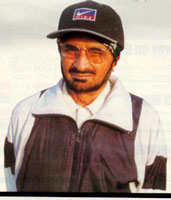
Photo Courtesy Inside Hockey
 egendary hockey
Olympian and Arjuna Puraskar winner Udham Singh died at his village
Sansarpur on March 23, following a heart attack. egendary hockey
Olympian and Arjuna Puraskar winner Udham Singh died at his village
Sansarpur on March 23, following a heart attack.
Udham Singh figured in the Guinness Book of Records for participating
in four consecutive Olympic Games (1952-1964). He was also selected for
the 1948 London Olympic Games, but could not go there due to an injury.
Udham Singh won 3 gold medals for India - Helsinki (1952), Melbourne
(1956), Tokyo (1964), and one silver - Rome (1960), at a time when India
was still at the peak of international hockey.
Apart from the Olympics, Udham was on the Indian team that toured
Afghanistan, Poland (1953), and led the squad for the 1959 tour of East
Africa. Udham played in the Warsaw International (1955), Lyon tournament
(1963) and was the vice-captain in an international tournament at Munich.
Out of competitive hockey, Udham took to coaching the State and Punjab
Police squads, and played a leading role in shaping the brilliant careers
of Ajitpal Singh, Harmik Singh, Surjit Singh and a host of other players.
Udham Singh was awarded the Arjuna Puraskar in 1965, after it had been
awarded to Prithipal Singh (1963) and Charanjit Singh (1964).
Born on August 4, 1928 - the year India earned Olympic honours at
Amsterdam - Udham was a product of DAV College. At the age of 19,
Udham won the Punjab State colours, which he retained for 17 years without
a break till 1965.
Udham Singh joined Punjab Police in 1949 as assistant sub-inspector. He
served with the police till 1966, when he switched jobs and joined
Border Security Force. Udham became an IPS officer in 1983, and retired
three years later.
Udham Singh was known for his zest for life, and till his end, was
coaching children at the hockey academy founded by him in his village. His
dream was to see Sansarpur, once known as the hockey nursery of India,
again contribute players to the national squad.
He had married for a second time only four years ago, and leaves behind his
wife and three-year old daughter.
GLOWING TRIBUTES: In Mumbai, glowing tributes were paid to Udham
Singh by his erstwhile Mumbai-based teammates Leo Pinto and Joe Antic.
Pinto, the 1948 London Olympics goalkeeper, said "The position of
inside-left was played with distinction by Udham. Defending the goal, I
could see his way of functioning, his uncanny dribbling skills. He was a
certainty for the 1948 London Games, before a hand injury ruled him out of
contention."
Joe Antic, the centre-half in the Rome Olympics where India failed to
win the gold for the first time since their debut in 1928, said "We
were together on the 1958 East African tour and the 1959 European tour. He
was an outstanding inside-left. India has stopped producing players like him."
|
| Rediff.com on Udham
Singh |
Article by Ajitpal Singh, courtesy Rediff
 dham
Singh and I come from the same village -- the famous Sansarpur village,
near Jalandhar. This village alone has produced more than a dozen hockey
Olympians, and it is indeed sad that we should lose a great player and
soul like Udham. dham
Singh and I come from the same village -- the famous Sansarpur village,
near Jalandhar. This village alone has produced more than a dozen hockey
Olympians, and it is indeed sad that we should lose a great player and
soul like Udham.
He is no more with us today, but when I go back down memory lane -- to
the mid fifties -- I remember how, as a school boy, I used to have a go at
hockey. And the source of my inspiration, of course, was none other than
the great Udham Singh himself. He had already taken part in two Olympics
by then; his dribbling was simply superb.
Once, a friend of mine and I joined hands to tackle him and ensure that
he did not score a goal. But we were mistaken. Two young boys were no
match for him and he scored goal after goal with impunity.
Udhamji was a role model not only for me but many others who
represented the country at the Olympics and in international events. He
was one of those who really initiated hockey in the village. Indeed,
there is no doubt about Udham's dedication. He had top class self-control.
Added to that, he was a strict disciplinarian, a great coach and a great
motivator. He wanted all other sportsmen to follow his footsteps.
I had the good fortune of playing under his supervision, and I must say
that as a coach he carved out the destiny of many a player who played for
the Border Security Force team, where he and others like myself were
employed. A fitness freak, he who would not let any of his young boys grow
lethargic. He ran with us every morning to make sure that we did not
slacken in our effort to stay fit. In turn, the boys would try very hard
to live up to his expectations.
When we talk of his contribution to Indian hockey we have to remember
that he took part in four consecutive Olympic Games - in 1952, 1956, 1960
and 1964 - and had three Olympic gold medals to his credit. He would have
represented the country in 1948 as well, but an injury kept him out of the
team.
A great inside-left, Udham played along with all-time greats like K. D.
Singh 'Babu' and Balbir Singh Sr., and was instrumental in some crucial
victories India registered during his time.
We lived in the same barracks and same room at times. His death is a
great, personal loss to Sansarpur village, myself and hockey lovers all
over the country. Dedicated players like him are not born every day. He
was of the finest order. I salute him.
|
| The Hindu on Udham
Singh |
Excerpts from an article by S. Tyagarajan
of The
Hindu
 eath has
deprived the hockey community of a giant in Udham Singh. The
doughty warrior, who not only symbolised the essence of hockey ethos of
Punjab, but also of India, passed away at Sansarpur, near Jalandhar. eath has
deprived the hockey community of a giant in Udham Singh. The
doughty warrior, who not only symbolised the essence of hockey ethos of
Punjab, but also of India, passed away at Sansarpur, near Jalandhar.
If Roop Singh portrayed, in the pre-partition days, the sum and
substance of the qualities that an inside forward should be endowed with,
Udham mirrored the charm and craft for well over two decades in the
post-war era.
It is difficult to convey to the enthusiasts of this generation the
classicism that Udham displayed on the field. Hockey for Udham Singh was
an art, an expression that filled the senses and triggered an emotional
experience.
The stick was to him what a paintbrush would be to an artist. It was a
throbbing spectacle whenever he fashioned his stocky frame to weave its
way through the rival defence and leave it in a state of inertia.
A stickler for details and a strict disciplinarian, Udham was a hard
taskmaster, not easily satisfied with achievements. He urged his wards to
strive for more.
A measure of his commitment cannot be better exemplified than by the
fact that Udham ignored the advice of his doctor to rest and recuperate
after the heart- attack a few weeks ago. He went to the playground in
Sansarpur to share some happy moments with his trainees. A second attack,
almost immediately, proved fatal.
A hockey legend is lost forever. Only memories of his deeds linger.
|
| India Needs a
Foreign Coach |
 nternational
Olympic Committee (IOC) member Ashwini Kumar has strongly urged the
Indian Hockey Federation (IHF) to immediately seek the services of a
reputed foreign coach to raise the standard of the national team. nternational
Olympic Committee (IOC) member Ashwini Kumar has strongly urged the
Indian Hockey Federation (IHF) to immediately seek the services of a
reputed foreign coach to raise the standard of the national team.
Speaking at a function organised by the Nehru Hockey Society in Delhi,
former IHF chief Kumar said: "Let us face it, we need a foreign
coach; there are no two ways about it. Our coaches can't formulate new
plans or tactics in this ever changing environment. The game is evolving
very fast and we just cannot afford to be the silent spectators to these
changes."
"It is time India changes its view of the game and discards old
concepts. The day of a set regime of tactics like the 2-3-5 formation are
over; it is total hockey now and we have to adapt to it."
He felt money should not be a problem in acquiring a foreign coach as
the IOC provides aid to National Olympic Committees for this purpose, and
warned that time is running out with only six months to go for the Sydney
Olympics.
"We have to do something urgently if we want to regain our old
glory," he said.
Ex-Olympian, Commander Nandy Singh, who also spoke at the function,
endorsed Kumar's demand, though he felt it is too late now.
"A foreign coach should have been brought at least two years
before the Olympics. I don't think that money was the problem at any
stage. The IOC is always there to help; in fact, they had already promised
money for the same."
|
| Spain Wins
Olympic Qualifiers (Men's) |
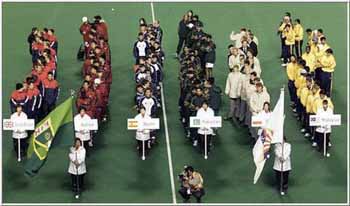
The Six Teams That Qualified for Sydney
Photo : S. S. Kanesan, The
Star of Malaysia
 he
qualifier for the Sydney Olympics men's hockey competition was held at the Nagai
Sports Park in Osaka, Japan, from March 9 to March 19. he
qualifier for the Sydney Olympics men's hockey competition was held at the Nagai
Sports Park in Osaka, Japan, from March 9 to March 19.
12 teams took part in the competition. The list included two former
champions - Pakistan and Britain, who won their last Olympic gold medals
in 1984 and 1988 respectively.
Pool A comprised South Korea, Britain, Japan, Belgium, New Zealand and
Poland. Pool B included Spain, Pakistan, Malaysia, Argentina, Switzerland
and Belarus.
South Korea and Poland
qualified from Pool A, while Spain and Pakistan qualified from Pool B. In the semi-finals, Spain beat Poland 4-1 while
Pakistan beat South Korea 3-1.
In the final, watched by the Emperor's cousin, Prince Takamado Nomiya, Spain beat Pakistan 3-2.
Spain led 2-0 at the break. Spain finished as the only unbeaten team in
the competition.
The six countries that qualified from Osaka were : 1. Spain 2. Pakistan
3. South Korea 4. Poland 5. Great Britain 6. Malaysia. The following were
the awards given.
| Award |
Winner |
Country |
| Best Player |
Piotr Mikula |
Poland |
| Best Goalkeeper |
Jun Takahashi |
Japan |
| Top Scorer |
Sohail Abbas |
Pakistan |
| Fairplay Trophy |
|
Korea |
6 countries had directly qualified for Sydney - holders Holland, hosts
Australia and continental champions India, Germany, South Africa and
Canada.
Argentina, which finished seventh at Osaka, is the first reserve team
in case the South African Olympic committee stands
by its decision not to field the men's hockey team in Sydney.
|
| Osaka Sidelights |
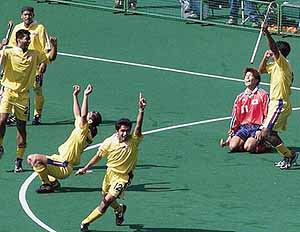
Agony and the Ecstasy : Japan out, Malaysia In
Photograph Courtesy : The
Star of Malaysia
 his
is the third Olympics in a row that Malaysia had to qualify for the
Olympics. On all three occasions, Malaysia was the last team to qualify. his
is the third Olympics in a row that Malaysia had to qualify for the
Olympics. On all three occasions, Malaysia was the last team to qualify.
In the 1991 qualifiers in Auckland, Malaysia finished fourth, in the 1995 qualifiers in Barcelona, Malaysia finished
fifth and now in the 2000 qualifiers in Osaka, Malaysia finished sixth.
The most unlikely team to qualify from Osaka was Poland.
The country has a very small hockey base, with 16 of the 18 players at
Osaka coming from one city - Poznan. The Poles, who began the qualifiers with two straight defeats,
came second in their pool.
"This is simply unbelievable. We only trained
about a month before this tournament," said Polish coach Piotr
Zgagazc.
Poland's bright spot came when they annihilated Great Britain 5:2, with Piotr Mikula
scoring all five goals. Poland had 9 field goal shots for its 5 goals and
no penalty corners.
Hosts Japan, who last played in the Olympics 32 years ago at
Mexico, came away empty-handed at Osaka. In a nationally televised match,
Japan lost in the playoffs with Malaysia to determine the final qualifying
spot. The Japanese team, which has a South Korean coach since 1996, was promised $100,000 if it qualified for the Olympics.
Japanese players spent 90 minutes daily on penalty corner hits, trying
out 22 different variations. If the players converted less than 50% of the penalty corners during practice, they
were made to train an extra 30
minutes.
|
| Pakistan's Deadly
Weapon |
 wenty three year
old Sohail Abbas emerged as the Osaka Olympic Qualifier's leading scorer
with 13 goals. Karachi-born Sohail had consecutive hat-tricks against
Spain and Belarus. wenty three year
old Sohail Abbas emerged as the Osaka Olympic Qualifier's leading scorer
with 13 goals. Karachi-born Sohail had consecutive hat-tricks against
Spain and Belarus.
Sohail Abbas told reporters that his main mission was to bring back the lost
glory of Pakistan hockey by winning the Olympics. "I do not play for
myself, but for the team and the country."
Former Australian captain and current Australian coach Terry Walsh has
described Sohail Abbas as among the top two penalty corner specialists
in world hockey.
Commenting on his powerful scooping style, Walsh said that Sohail's
natural skill of scooping and flicking is his main strength. He said that
Sohail is a devastating force in Pakistan hockey, scoring multiple goals
for his country. He will make the first choice in any team in the world.
In 1999, Sohail scored 62 goals to set a world record of maximum goals
in a calendar year. The previous record of 58 goals in a calendar year was
held by Dutch penalty corner striker Paul Litjens.
The coaches of Germany (Paul Lissek), Australia (Terry Walsh),
Holland (Maurits Hendriks) and Canada (Shiaz Virjee) were all in
Osaka, taking video recordings of every penalty corner taken by Sohail
Abbas. The surprise was that India was not represented by its coach in Osaka.
|
| India Last In
Olympic Qualifier (Women) |
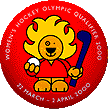
 he
qualifier for the Sydney Olympics women's hockey competition was held at
Milton Keynes, England, from March 24 to April 2. he
qualifier for the Sydney Olympics women's hockey competition was held at
Milton Keynes, England, from March 24 to April 2.
India went for the competition leaving its five best players behind -
forwards Pritam Rani Thakran and Manjinder Kaur, centre-half Sita Gussain,
full-back Sandeep Kaur and Nidhi Khullar.
Pritam Siwach and fullback Sandeep Kaur have got married in the last
few months, leading to changed priorities. Nidhi Khullar, married to Mukesh Kumar, gave birth to a child recently. Sita Gussain and inside forward
Manjinder Kaur had quoted domestic reasons.
10 teams took part in the competition. Pool A comprised Spain, Germany, USA, India and Ireland. Pool B included
Russia, China, New Zealand, Japan and Britain.
India came last in the tournament, losing all its matches and scoring
only 3 goals in the entire tournament. India's results were as follows:
| Date |
Match |
Goal
Scorer - India |
| March 24 |
Spain beat India 3-1 |
Mamata Kharab (70 m) |
| March 25 |
Ireland beat India 1-0 |
|
| March 27 |
Germany beat India 4-0 |
|
| March 29 |
USA beat India 2-1 |
Jyoti Sunita Kullu (30 m) |
| April 1 |
Russia beat India 2-1 |
Mamata Kharab (17 m) |
Germany and Spain topped Pool A, while Britain and New Zealand topped
Pool B. While these 4 countries qualified for the Sydney Olympics, the
crucial 5th and last qualifying spot was won by China, who beat USA 2-0.
The above teams will join Australia (hosts, defending Olympic champions,
Oceania Cup winner), Argentina (Pan Am Games winner), Korea (Asian Games
winner), Netherlands (European Nations Cup winner) and South Africa (All
Africa Games winner) at Sydney.
The Indian team to Milton Keynes was as follows:
Goalkeepers: Tingonleima Channu (captain), Helen Mary.
Full backs: Amandeep Kaur, Marystella Tirkey, Kanti
Baa.
Halves: Sunita Dalal, Suraj Lata, Sumrai Tete, Neha
Singh, Kamala Dalal, Jyoti Kullu, Ferdina Ekka.
Forwards: Mamta Kharab, Surinder Kaur, Papki Devi,
Manorama Goswami.
Officials : Head Coach - G. S. Bhangu; Assistant Coach
- Jaswinder Singh; Manager - Rupa Saini
|
| Europe
- Asia Dominate World Hockey |
 oth the men's
and women's Olympic Qualifiers took place last month - the men's event
being held in Osaka, and the women's in Milton Keynes, England. Both the
tournaments highlighted the fact that hockey is a sport primarily played
in Europe and Asia. Hockey, unlike soccer, has not grown beyond its
Eurasian borders. oth the men's
and women's Olympic Qualifiers took place last month - the men's event
being held in Osaka, and the women's in Milton Keynes, England. Both the
tournaments highlighted the fact that hockey is a sport primarily played
in Europe and Asia. Hockey, unlike soccer, has not grown beyond its
Eurasian borders.
In the men's qualifiers, 10 of the 12 participating teams were
from either Europe or Asia. All the six teams that qualified from Osaka - Spain,
Pakistan, South Korea, Poland, Great Britain and Malaysia - are from these
two continents.
Even a traditional hockey power like Argentina has not played in any major world-ranking
tournament since 1997. Argentina failed to make it to
the Utrecht World Cup in 1998, and now for the Sydney 2000 Olympics as
well.
In the women's qualifiers, 8 of the 10 participating teams were
from either Europe or Asia. 4 out of the 5 teams that qualified from Osaka
- England, Germany, Spain and China - are from these two continents.
In the Sydney Olympics, 75% of the men's teams (9 of 12) and 60%
of the women's teams (6 of 10) will be from Europe or Asia.
Even in the 1998 Utrecht World Cup, 75% of the men's teams (9 of
12) and nearly 60% of the women's teams (7 of 12) were from Europe
or Asia.
|
| Oxford - Cambridge
Centenary Test |
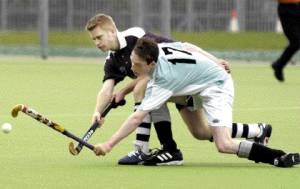
Photo Courtesy Hugh Routledge of The Times
 he
longest-standing continuous hockey fixture in Britain is probably the
annual Oxford-Cambridge varsity match. The first men's match took place in
Oxford in 1890, with Oxford winning that match. The first women's match
was held at
Wimbledon Common in 1894. he
longest-standing continuous hockey fixture in Britain is probably the
annual Oxford-Cambridge varsity match. The first men's match took place in
Oxford in 1890, with Oxford winning that match. The first women's match
was held at
Wimbledon Common in 1894.
The 100th edition of the Oxford-Cambridge men's varsity match took
place on March 7 at Milton Keynes. Oxford won the centenary match 2-1 to
retain the Deloitte & Touche Trophy. Oxford is unbeaten in the annual
fixture since 1991. However, Cambridge leads the series 45-38.
David Sellick gave Oxford the lead in the 13th minute, while Mark
Darbon scored the second in the 22nd minute. Cambridge who were missing an
injured Thierry Gruslin, their captain and a Belgium international, pulled
one back through a penalty stroke by Edward Hauck in the 62nd minute. David
Sellick of Oxford was declared the Man of the Match.
Oxford plays in the First Division of the National Hockey League, while Cambridge plays
in the East League Premier Divsion. Oxford University has its own water-based artificial pitch at Iffley Road.
The Oxford-Cambridge women's match ended in a 1-1 draw. Vicky Pope
scored for Oxford in the 14th minute, only for Hazel Mansfield to equalise
for Cambridge in the 27th minute. Cambridge remains unbeaten in the
women's fixture since 1995.
Since 1998, the men's and women's matches have been staged
on the same day at the National Stadium in Milton Keynes.
|
| Nostalgia - India's
First Goalkeeper |
Article courtesy Godfrey
D'Souza of Toronto
 ichard 'Dickie'
Allen first played for India in 1926 when the Indian Hockey Federation (IHF)
joined the FIH as
a full-fledged member. The IHF then had its headquarters at Gwalior. In those days hockey
had a princely
patronage. ichard 'Dickie'
Allen first played for India in 1926 when the Indian Hockey Federation (IHF)
joined the FIH as
a full-fledged member. The IHF then had its headquarters at Gwalior. In those days hockey
had a princely
patronage.
When India went on it's first foreign tour to New Zealand in 1926, Richard was
the first choice goalkeeper with Arthur Hind in reserve. During the 1926 tour,
India lost the opening test but won the
second, so the series was squared. However, India won all the other matches against local teams.
Richard Allen played in the 1928 Olympics in Amsterdam where he did not
concede a single goal. In the 1932 Olympics at Los Angeles, he conceded only 2 goals,
while in the 1936 Games at Berlin, he conceded a solitary goal to Germany in the final.
The Guinness Book of World Records mentions this as a goalkeeping record, since he only conceded a total of
only 3 goals during an Olympic career spanning 3 Olympic
games.
Richard could have created another record by
representing India in 5 Olympics had the 1940 and 1944 games not
been cancelled because of the war.
Richard was at that time employed in Calcutta with Port Commissioners, which provided
the backbone of Indian teams to the Olympics till 1960.
Eventually, Richard settled in Bangalore and was a regular visitor at the Bangalore
Nationals during the seventies where he was wheeled to the games by his
family.
I have not heard about him since then.
|
| Indian Airlines Win
K. D. Singh 'Babu' Tournament |
 he 20th All India K.
D. Singh 'Babu' memorial invitation prize money hockey tournament was held
from March 10 to March 18 in Lucknow. he 20th All India K.
D. Singh 'Babu' memorial invitation prize money hockey tournament was held
from March 10 to March 18 in Lucknow.
In the quarter-final matches, Punjab and Sindh Bank (PSB) defeated Central
Reserve Police Force, Delhi, by a solitary second half goal, while Indian
Airlines defeated Corps of Signal, Jalandhar, by a first half goal.
In later quarter-final matches, Border Security Force (BSF),
Jalandhar, defeated North Eastern Railway, Gorakhpur, 3-0, while Punjab
Police defeated Army Supply Corps, Jalandhar 3-0.
Both the matches at the semi-final stage were decided in sudden death. In
the first game, PSB defeated Indian Airlines, 5-4 in sudden-death
tie-breaker. The match had earlier ended in a goalless draw despite
fifteen minutes of extra time.
In the other semi-final, both BSF and Punjab Police were level at 5-5
after the first set of penalty strokes. In sudden death, S. Hezen and
Sushil Kumar scored for BSF, while Baljeet S. Bhullar scored for Punjab
Police. Harpreet Singh missed his attempt.
In an all-Jalandhar final held on March 18, Punjab & Sindh Bank
defeated arch rivals and holders, Border Security Force, 3-2 to win the
20th K. D. Singh 'Babu' tournament.
|
| Deccan Herald Hockey
League in Karnataka |
 ockey in
Karnataka has found a valuable ally in the Bangalore-based newspaper
Deccan Herald. They not only are the title sponsors of the state hockey
league, but also provide good exposure to local hockey in the state. ockey in
Karnataka has found a valuable ally in the Bangalore-based newspaper
Deccan Herald. They not only are the title sponsors of the state hockey
league, but also provide good exposure to local hockey in the state.
The results of the Deccan Herald state hockey league were as
follows:
| League |
Winner |
Runner-Up |
| Super Division |
Madras Engg. Group |
Karnataka State Police |
| 'A' Division |
Wheel and Axle Plant |
Hindustan Aeronautics Ltd. |
| 'B' Division |
MLI, Belgaum |
Coorg Hockey Association |
| 'C' Division |
Sports Authority of India |
Indian Airlines |
An awards function of the league was held at the premises of the
Karnataka State Hockey Association (KSHA). Minister of State for
Information and Publicity, Professor B. K. Chandrashekar, the chief guest,
pledged to help construct floodlights at the Akkithimannahalli stadium.
KSHA President D. S. Murthy surprised his colleagues by announcing his
retirement from the association, though his term expires in August.
"It is time I passed the baton on to somebody else," he said
during his welcome address.
Karnataka Olympic Association (KOA) President Ajay Kumar Sarnaik
commended Deccan Herald for its support to hockey and athletics. He said:
''Other corporates should utilise the 100% tax exemption granted by the
centre to promote sports."
|
| Tailpiece -
Ambassadors of Hockey |
 uring the Osaka
Olympic Qualifiers, Pakistan's hockey players visited Toyosato Elementary
School in Osaka to give a demonstration of dribbling and passing skills.
About 700 students gathered in the ground and gave a thunderous applause
to the team on its arrival. uring the Osaka
Olympic Qualifiers, Pakistan's hockey players visited Toyosato Elementary
School in Osaka to give a demonstration of dribbling and passing skills.
About 700 students gathered in the ground and gave a thunderous applause
to the team on its arrival.
Pakistan team manager Islahuddin, speaking through an interpreter,
thanked the school's administration for inviting them. He expressed the
hope that the sport would gain more popularity in Japan with the staging
of the Olympic qualifying tournament there.
The president of the school wished the team success in the Sydney
Olympics and hoped they would win a gold medal. On the occasion, the
students presented traditional Japanese dance 'Saran Bushi'.
Islahuddin gave away two hockey sticks to the school and a ball signed
by the members of the team. He also distributed the Pakistan national flag
among the students. The school in turn presented some souvenirs to the
Pakistan hockey team.
|
![]()